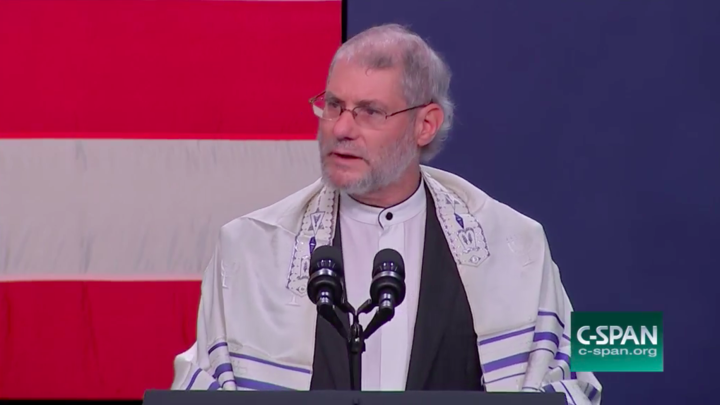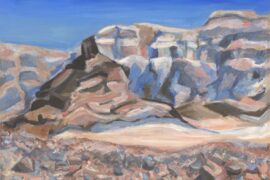United States Vice President Mike Pence sparked outrage during a Michigan campaign stop this week by inviting Messianic Christian “rabbi” Loren Jacobs to say a prayer for the victims of the Pittsburgh synagogue massacre.
Jacobs, who was ordained at an evangelical seminary and uses the title “rabbi” in his role at the Messianic “Shema Yisrael” synagogue, invoked “Jesus the Messiah” during his prayer from Pence’s Michigan podium on Monday.
“God of Abraham, God of Isaac, God of Jacob, God and Father of my Lord and Savior Yeshua, Jesus the Messiah, and my God and Father too,” Loren Jacobs intoned.
“Our nation is so divided right now. The hate-inspired shooting in the synagogue in Pittsburgh is the latest evidence of this. Lord, please work so that instead of division in our nation there is unity and peace.”
The incident, which outraged Jews across America’s political spectrum, took place just two days after alt-right gunman Robert Bowers shot dead 11 people at a Pittsburgh synagogue while shouting that all Jews should be killed.
Following the public outcry over Jacobs, a spokesman for Pence claimed that it wasn’t the vice president but local Republican candidate Lena Epstein who invited Loren Jacobs.
“He was invited by Lena Epstein to offer a prayer at the event, which he did early in the program,” said the statement. “The VP invited him back on stage to deliver a message of unity. He was not invited by the VP’s office to speak on behalf of the Jewish community.”
“Messianic Judaism” combines Jewish traditions with evangelical Christianity and is commonly referred to as “Jews for Jesus.”
Some Messianic Jews seek acceptance as another one of the American Jewish community’s many religious denominations, but most Jews reject what’s commonly perceived as offensive efforts to missionize our people.
While the American Jews are justified in both their anger at Pence and general resistance to idolatrous Christian ideas, most are likely unaware of the fact that the very existence of “Judaism” as a religious identity with denominations is already the christianization of Jewish identity.
For many centuries, Jews throughout the world self-identified as part of an ancient people living in exile from its land but in accordance with a portable version of the civilization we left behind. But following several harsh cycles of brutal persecution, especially in European countries, many Jews became desperate to avoid further oppression.
When offered emancipation, inclusion and civil rights in Germany and France during the European Enlightenment period, many Jewish leaders redefined their own identities in order to conform to a Christian model more familiar to their newly benevolent hosts. They re-branded themselves as Germans and Frenchmen just like their neighbors and redefined their ancient Torah way of life as a religion called “Judaism,” which ultimately mirrored the religion of their Christian neighbors by branching out into separate denominations.
Resistance to Christian influence can’t begin and end with anger over a Messianic “rabbi” invoking Jesus in a statement mourning murdered Jews. It needs to examine the very paradigm through which Jews – especially, but no longer only, Ashkenazi Jews – understand ourselves and our relationship to our own culture, traditions and ancient spiritual ideas. We need to see ourselves not through the lens of Christian civilization but actually through the perspective of our people for thousands of years.
There are layers to the colonization of Jewish identity and rejecting a denomination of Judaism that worships Jesus only scratches the surface. Jews in the US need to stop self-identifying as “Americans with a Jewish religion” and start seeing themselves as descendants of the ancient Hebrew tribes.
At the end of the day, Diaspora Jews can at best be supporting characters in someone else’s story. But we’re fortunate to live in a generation in which the nation of Israel has been reborn and we can once again play leading roles in the story of our own people.
Opting to become characters in our own story rather than playing minor roles in someone else’s shouldn’t require isolation from the world or retreat from struggles on behalf of other oppressed peoples.
By participating in our own story, we can actually identify and understand oppressive systems through the lens of our own people’s culture, value system, collective experience and ancient wisdom. Only then we can bring our full selves as Jews to larger movements that challenge injustice and exploitation throughout the world.






The ;messianic’ movement is not Jewish and only disguises itself as such to lre non suspecting Jews to their cult. They are tyring to murder the Jews spiritually instead of physically.